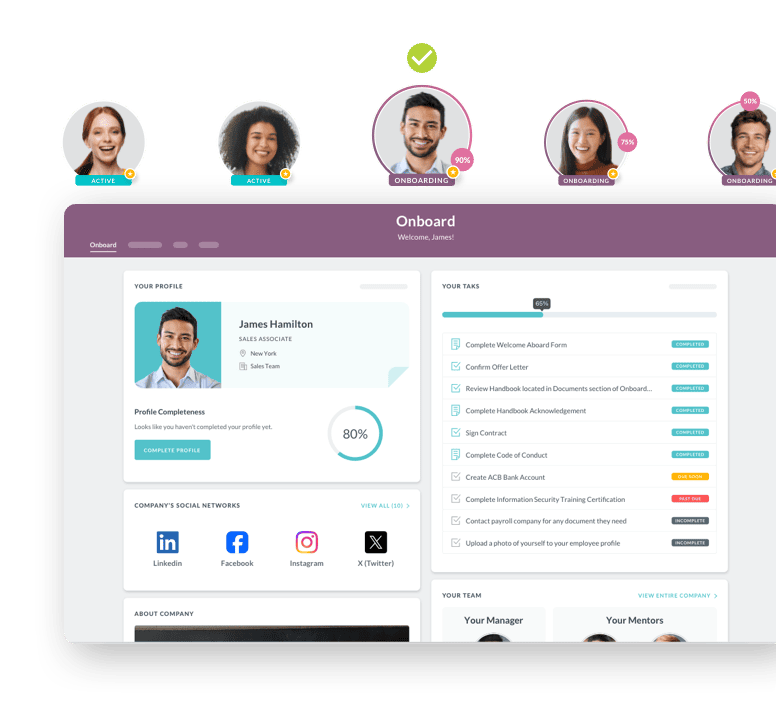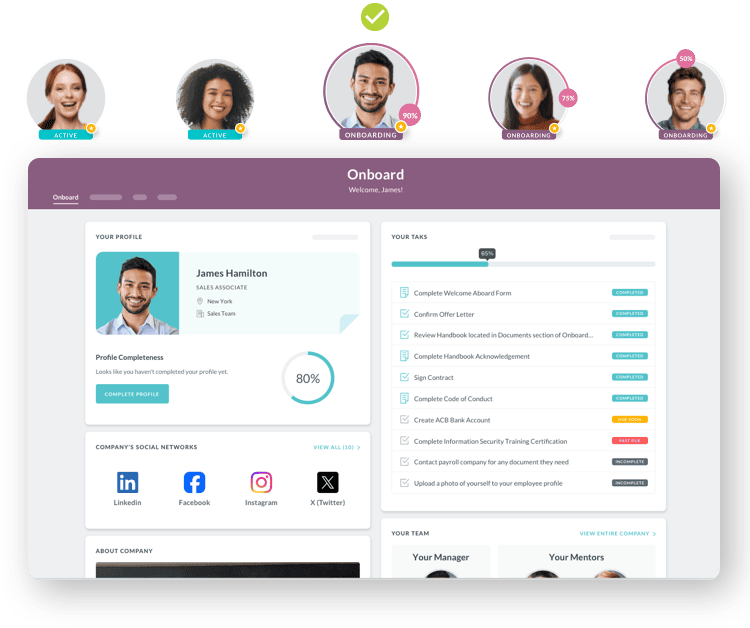- How Readable Is the Resume?
- Is It Concise Yet Compelling?
- Does It Show Progressive Career Growth?
- Are There Any Gaps in Employment?
- Is the Resume Tailored to Your Job Posting?
- What Kind of Online Presence Does the Candidate Have?
- Could the Candidate Be Exaggerating?
- Is There Too Much Personal Information?
- Does the Candidate Have Any Company Recognitions?
- Are References Included or Not?


 Cut onboarding time
by 60%—here's the
Ultimate Checklist
that helped do it.
Cut onboarding time
by 60%—here's the
Ultimate Checklist
that helped do it.

Hiring the wrong candidate for a job can be a costly mistake, much like a contract dispute can be detrimental to business relationships. When all you have in front of you is a pile of resumes, it can be hard to make a decision. If you know what to look for in a resume, it is easier to choose the right candidate. Simply looking at the basic information like education, skills, and work experience is not enough. You need to find out more about candidates and what benefits they have for your business, similar to how contract managers evaluate potential agreements. Here are some questions to ask that will help you to make a good decision, drawing parallels to effective contract management practices.
1. How Readable is the Resume?
When you're presented with many resumes to read, the readability of a resume can make a difference. If it is sloppy and poorly structured, you can quickly weed it out. A resume should impress you at first glance, and that has much to do with its format. Candidates could create a unique CV using different resume templates. You shouldn't waste any energy at all on resumes with grammar issues, spelling errors, and incoherent thoughts. You're not looking for a showy format but simply one that presents all the necessary information in a clear and logical way. It shouldn't use business-speak or technical jargon in an attempt to distract you from any gaps in experience or skills, similar to how clear contract language is essential for avoiding contractual disputes.
2. Is It Concise Yet Compelling?
A resume shouldn't tell a candidate's whole life story or use flowery language. It should be straight to the point and offer the most pertinent information. Focus on candidates who use hard numbers rather than irrelevant fluff. For example, knowing that a candidate increased a company's website hits from 100 to 100,000 is an impressive statistic. You should feel you want to call the candidate in to discuss more details. Unless a candidate is looking for a position high up on the corporate chain, a one-page resume is sufficient. Many candidates today will get help from a CV company with professional writers to make sure their applications are concise and yet present all their key skills and relevant experience in a compelling way. This approach is similar to effective contract dispute resolution, where clarity and conciseness are key to avoiding misunderstandings.
3. Does It Show Progressive Career Growth?
You should see growth in the candidate's career progression. If you see stagnation or regression, this is a red flag. If you want a candidate who will learn and grow with the company, it helps to know that they have done this in the past. The resume should show upward progression as a candidate masters new skills. They may have even moved to another company to avoid stagnating in a specific role. If candidates appear to rise meteorically in their responsibilities, it could be fiction rather than the truth. The advancement should follow a realistic timeline. This progression mirrors the concept of contract lifecycle management, where agreements evolve and mature over time.
4. Are There Any Gaps in Employment?
Before the pandemic, gaps in employment were a quick way to assess job seekers and eliminate unsuitable candidates. Today, gaps in employment for the years 2020 and 2021 may be the norm, depending on the industry. You need to consider whether candidates have used any gaps in employment in a productive way. Candidates should always offer explanations up front for any gaps in employment. Repeated gaps in employment outside of the pandemic years could signal underperformance. It could indicate that candidates are trapped in a negative cycle that they could repeat. In contract management, gaps in service or performance can be seen as a form of contract breach, requiring careful evaluation and potentially dispute handling.


5. Is the Resume Tailored to Your Job Posting?
If the specifics listed on the resume relate to your company and the job you advertised, this is a good sign. It means the candidate has not just copied and pasted information but has tailored the resume to suit the job posting. You can quickly eliminate generic resumes sent out to all positions within a specific geographical area. Focus on those that show what specific benefits a candidate could offer to your business. This tailoring process is akin to contract negotiation, where terms are customized to meet the specific needs of all parties involved.
6. What Kind of Online Presence Does the Candidate Have?
The online presence of a candidate can be very revealing. A LinkedIn account can help you to understand the value a candidate could add to your business. Candidates who provide links to social accounts like LinkedIn on their resumes can show that they have contacts in the industry and have written posts relating to it. Other links they could include are Quora profiles, GitHub contributions, Twitter handles, or whatever else they choose to list. A candidate's online presence can also reveal more about their personality and their values. This could help you to find out more about them as a person and see whether they would be a good fit for your company culture. In the world of contract management, a digital contract repository serves a similar purpose, providing easy access to important information and past performance.
7. Could the Candidate Be Exaggerating?
Many candidates lie about their skills and exaggerate the time they spent in certain positions. When you read through resumes, you have to be alert for possible exaggerations. Being confident about their skills is one thing, but being over-confident is another. If a candidate lists all the skills you require on your job posting, even when they don't fit with their work history, you can be quite sure they are exaggerating. Any inconsistencies in the resume can be a sign of exaggeration. This scrutiny is similar to ensuring contract compliance and verifying that all parties are meeting their contract obligations.
8. Is There Too Much Personal Information?
If a candidate includes too much personal information in a resume, it could be an attempt to make up for a lack of experience. Any personal information included in the resume must apply to the role or provide character insights. If information becomes too personal or revealing with no relevance to the role, it's best to move on. It may be very interesting that a candidate is trying to learn how to code in their spare time. On the other hand, knowing a candidate for a company bookkeeper position collects dolls as a hobby is too much information. The fact that a candidate is happily married with three children isn't relevant to their ability to fulfill a certain role. A summer job caring for animals at an animal shelter is only relevant if a veterinary student is applying to a veterinary clinic. In contract management, it's crucial to identify key contract stakeholders and focus on relevant information without getting sidetracked by extraneous details.
9. Does the Candidate Have Any Company Recognitions?
Any awards or recognitions candidates earned can help them stand out. They can often demonstrate soft skills, such as teamwork and problem-solving abilities. The awards should be relevant to mean something. Candidates should include the official title of the reward, the date, and the level of recognition. They should also include what accomplishments the award recognizes. Consistent best performer or employee of the month awards indicate a strong work ethic. Community and civic awards show a candidate's commitment to making a positive impact. These recognitions can be likened to the achievements of a successful contract management team in streamlining processes and resolving contract disputes effectively.
10. Are References Included or Not?
It used to be common practice to list at least two references on a resume. In the digital age, this is no longer necessary. Candidates can proactively collect references in case you request them. It is currently regarded as more important for candidates to keep contact referee contact details private until they request them. This is because so many candidates apply for jobs, and contact details may not be kept as secure as they should be. When candidates have reached the final stages of selection, this is when you can request contact details. At this stage, you can ask candidates for three to four referees to attest to their professional experience and skills. It's standard practice now for candidates to create a separate referee list and submit it via email. This process of verification is similar to how contract managers verify the credentials and past performance of potential business partners before entering into new agreements.
Conclusion
Hiring the right employee is crucial, as it can be costly to make a mistake. Ultimately, a resume helps you to find out whether a candidate can do the job. Take the time to look for key indicators of professionalism in the applications you receive. It's not enough just to check off a list of the skills and experience you require. Applying the above tips will help you to effectively eliminate poor candidates and hire top talent you are able to retain for the long term. This approach, combined with effective contract management practices such as contract automation and standardization, can significantly improve your organization's hiring process and overall operational efficiency.
 Discover how our HR solutions streamline onboarding, boost employee engagement, and simplify HR management
Discover how our HR solutions streamline onboarding, boost employee engagement, and simplify HR management

Keep Reading
Why Healthcare Organizations Choose HR Cloud Over Alternatives
What is the Best Healthcare HR Software for Medical Organizations?
The Complete Guide to Remote Work Policy Compliance: Navigating Multi-State Tax, Legal, and Security Requirements in 2026
With 22.9% of US employees working remotely as of Q1 2024—up from 19.6% the previous year
Enterprise HRIS Implementation: Rippling vs HR Cloud Integration Capabilities and Deployment Success
Enterprise HR Software Implementation Comparison
Like What You Hear?
We'd love to chat with you more about how HR Cloud® can support your business's HR needs. Book Your Free Demo

Build a Culture of Recognition. Boost Engagement. Guaranteed.
Workmates empowers employees to stay informed, connected, and appreciated—whether they’re on the front line, in the office, or remote. Recognition drives 12x higher engagement.Trusted by industry leaders in every sector




Cut Onboarding Costs by 60%.
Take the confusion and follow-ups out of onboarding with automated workflows, digital forms, and structured portals—so new hires ramp faster 3X quicker.Trusted by industry leaders in every sector





